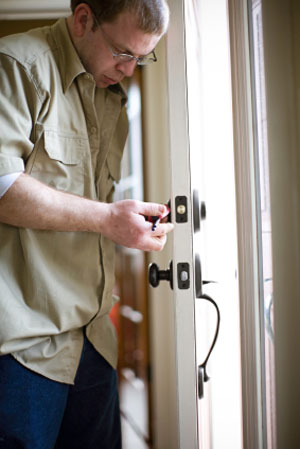Locksmith
Tasks & duties

Locksmiths may do some or all of the following:
-
discuss security needs with clients
-
install and repair locks, safes and alarm systems
-
cut or make keys to fit locks
-
open jammed locks and safes
-
advise on locks, safes and general security
-
develop and design master key systems
-
reset combination locks
-
unlock vehicles and make replacement keys if necessary
-
help law enforcement agencies with tenancy evictions, repossessions, search warrants, and forensic investigations
Skills & knowledge
Locksmiths need to have:
-
knowledge of master keying, key making and key cutting
-
knowledge of different lock types, safes and locking mechanisms
-
knowledge of lock repair methods and locksmith workshop equipment
-
knowledge of security alarm systems
-
excellent technical skills
-
problem-solving skills and the ability to think laterally
-
good communication skills
-
basic computer skills
Familiarity with hand and power tools is also useful.
Entry requirements
To become a locksmith you need to complete a three-year apprenticeship and gain a National Certificate in Locksmithing. Locksmith apprenticeships are part of the Modern Apprenticeships Scheme, which is for people aged 16 to 21.
Locksmiths must not have any criminal convictions (particularly ones involving dishonesty) that have a term of imprisonment attached. A security guard's licence may be required and it is helpful to have a driver's licence.
-
Skills4Work website - information on apprenticeships, including locksmithing
-
Competenz website - information about the national certificate in locksmithing
Secondary education
Sixth Form Certificate or NCEA equivalent in subjects such as English, maths, workshop technology and ICT are useful.
Training on the job
Locksmiths gain skills on the job.
As part of their training, locksmith apprentices working towards their certificate are sent on a three-week block course to the Northern Melbourne Institute of TAFE (Technical and Further Education). Costs to attend the course are subsidised.
Qualified locksmiths further their knowledge by attending conferences and seminars where locksmiths trade information and experiences.
Registration
Registration is not necessary but employers and their staff are often members of one or more of the following organisations:
Useful experience
Useful experience for locksmiths includes:
-
basic engineering and mechanical workshop skills
-
basic welding, tool and die-making work
-
metalworking, woodworking and carpentry
-
panelbeating
-
previous work with electronic equipment
-
any kind of problem-solving experience
Related courses
Mechanical Engineering
For more information, please refer to Career Services.
Document Actions
